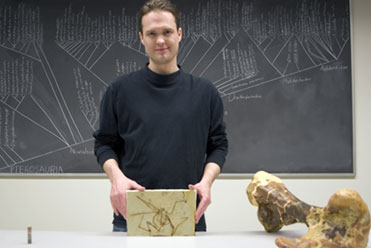 |
Brian Andres
Department of Geology and Geophysics
Yale University
Kline Geology Laboratory
P.O. Box 208109
New Haven, CT 06520-8109
U.S.A.
 That
I became interested in paleontology at a young age is not unusual in this field,
though at three I might tip the scales a bit. When asked once on camera by a
local reporter why I was still interested, I could not think of anything better
than I just never grew out of it. I still have not come with a better answer.
When I was sixteen, I was given my start in this field by Louis Jacobs as a
volunteer and later a paid preparator at Southern Methodist University in
Dallas; a job I would return to for the next six years. I went on to The
University of Texas Austin where I received degrees in Geology and Biology under
Tim Rowe. There I worked as a curatorial assistant and modern specimen
preparator at the Vertebrate Paleontology Lab, ran the undergraduate geology
organization, and participated in field expeditions to Texas and Arizona. I
received my Masters degree in the Biology Department of George Washington
University under Jim Clark. There I began working on the group I still work on
today, the pterosaurs. My Masters research project included the description of
two new species of pterosaurs from China and the analyzing of the phylogenetic
relationships of the pterodactyloid pterosaurs. There I also participated in the
Sino-American Expedition to Xinjiang, China, and I am currently describing two
new species of pterosaurs discovered by this expedition. Today I am a doctoral
candidate in geology under Jacques Gauthier at Yale University. My current
research entails the delineation of the phylogenetic systematics of the
Pterosauria, with projects spanning their entire 150 million year history. In
addition, I have had the opportunity to conduct fieldwork in Utah and design
exhibits for the Peabody Museum. Since my start, I have had the chance to do
field work in the American Southwest and China, travel to 4 continents including
six times to China, and name some new pterosaurs. I'm glad I never did grow out
of it. That
I became interested in paleontology at a young age is not unusual in this field,
though at three I might tip the scales a bit. When asked once on camera by a
local reporter why I was still interested, I could not think of anything better
than I just never grew out of it. I still have not come with a better answer.
When I was sixteen, I was given my start in this field by Louis Jacobs as a
volunteer and later a paid preparator at Southern Methodist University in
Dallas; a job I would return to for the next six years. I went on to The
University of Texas Austin where I received degrees in Geology and Biology under
Tim Rowe. There I worked as a curatorial assistant and modern specimen
preparator at the Vertebrate Paleontology Lab, ran the undergraduate geology
organization, and participated in field expeditions to Texas and Arizona. I
received my Masters degree in the Biology Department of George Washington
University under Jim Clark. There I began working on the group I still work on
today, the pterosaurs. My Masters research project included the description of
two new species of pterosaurs from China and the analyzing of the phylogenetic
relationships of the pterodactyloid pterosaurs. There I also participated in the
Sino-American Expedition to Xinjiang, China, and I am currently describing two
new species of pterosaurs discovered by this expedition. Today I am a doctoral
candidate in geology under Jacques Gauthier at Yale University. My current
research entails the delineation of the phylogenetic systematics of the
Pterosauria, with projects spanning their entire 150 million year history. In
addition, I have had the opportunity to conduct fieldwork in Utah and design
exhibits for the Peabody Museum. Since my start, I have had the chance to do
field work in the American Southwest and China, travel to 4 continents including
six times to China, and name some new pterosaurs. I'm glad I never did grow out
of it. |